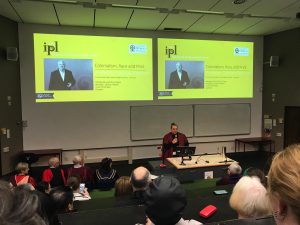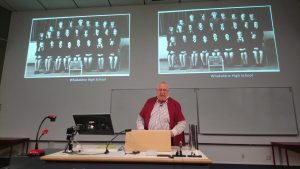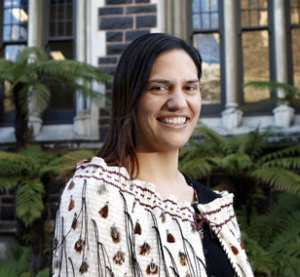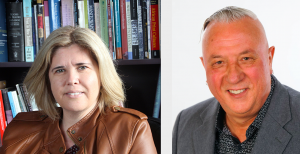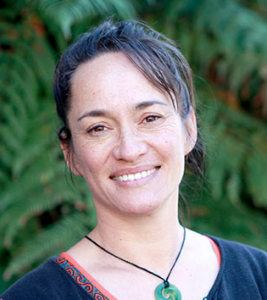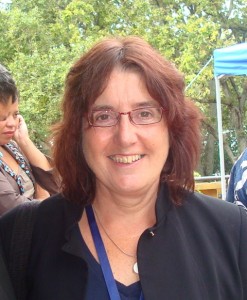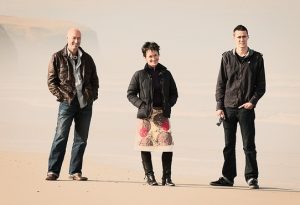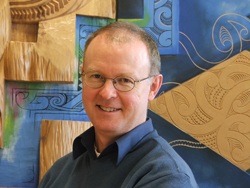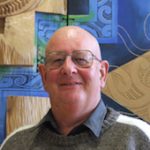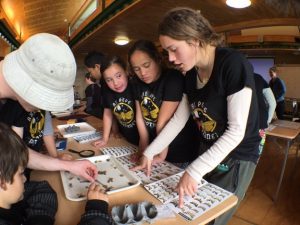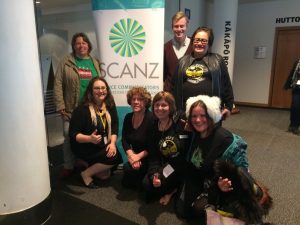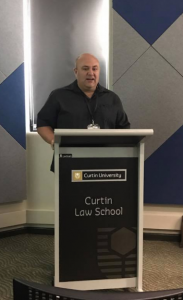Colonialism, Race, Print and Intestinal Fortitude
[From Professor Poia Rewi]
On Monday, 29 July 2019, Archway 1 was treated to a powerful inaugural professorial lecture by Professor Lachlan (Lachy) Paterson. Vice Chancellor, Professor Harlene Hayne, welcomed whānau stretching from Dunedin to the Bay of Islands and Tasmania; and University of Otago academics and friends to hear some strong messages on subject matter that requires careful navigation and courage.
Lachy duly acknowledged his whānau, senior leaders and colleagues in Te Tumu and across the wider university. He also made a special ‘shout out’ to client services staff who, as he said, “without them, the University would grind to a halt”.
Being promoted to Professor this year, Lachy, a non-Māori, a self-proclaimed Pākehā New Zealander ensconsed in Māori language texts, Māori-language print culture; the Treaty of Waitangi and Māori social, cultural, political and religious history, courageously and non-hesitantly gave his lecture on these topics; an academic historiography that demonstrated the multifarious nature of his teaching, research and engagement.
His lecture began with discourses from government newspapers published in the mid-1800s, and the nature of colonial racial discourse, in which Māori identity and culture was portrayed. He then discussed Māori and Pākehā attitudes towards race mixing. He concluded by extending a challenge that ‘we need to be vigilant and challenge any racist ideas that might re-appear today’.
This evocative conclusion rounded off a well-received lecture. His sustained high delivery and performance across research, teaching and community service provided the strong foundation upon which the University of Otago Promotions committee promoted him from Associate Professor to Full Professor in 2019.
After his lecture, attendees were invited by Prof. Tony Ballantyne to the University of Otago Staff Club for refreshments and to reconnect as friends and colleagues and continue conversations on the content they were privileged to hear.
Upon reflection of the lecture, his tuakana Gavin aptly summised, “ If more people took on board what Lachy talked about today, what better place than New Zealand would there be for people to live in harmoniously”.
Te Tumu in this year’s Marsden Round
This has been a great year for research in Te Tumu. Every November Te Pūtea Rangahau a Marsden (Marsden Fund), run by the Royal Society Te Apārangi, announces its forthcoming research grants. Winning a grant is a two stage process, with applicants having to get past a preliminary round, then develop their applications for the second round; they have about a 10% chance of success in the Humanities and Social Sciences panels. There are six successful applications within the Division of Humanities, three of which have a Te Tumu connection.
Dr Karyn Paringatai‘s project “E kore au e ngaro! The enduring legacy of whakapapa” ($823,000, Social Sciences panel) looks at how the knowledge of whakapapa can impact on health, with particular reference to Māori affected by the CDH1 cancer-causing gene. Click here for more information. Professor Parry Guilford, Director of Otago’s Centre for Translational Cancer Research, is an associate investigator on the project.
Associate Professor Lachy Paterson is a principal investigator alongside Associate Professor Angela Wanhalla (History Department) on “Te Hau Kāinga: Histories and Legacies of the Māori Home Front, 1939-1945” ($746,000, Social Sciences panel), exploring the lived experiences of Māori who remained in New Zealand during the Second World War. Click here for more information. Although the project begins next year, one of our undergraduate students, Haeata Watson, has already started a project looking at Ngāti Kahungunu experiences, funded through a Ngā Pae o te Māramatanga Summer Internship.
Both Karyn and Lachy are based in Te Tumu’s Māori Studies programme, occasionally teaching into the Indigenous Development programme. Karyn also coordinates the Master of Indigenous Studies programme.
Professor Merata Kawharu, who until recently held an adjunct position within Te Tumu but is now based at the Centre for Sustainability, was also successful. Her project, “A question of identity: how connected are Māori youth to ancestral marae, and does it matter?” ($605,000, Humanities panel) will investigate the relationships that young Māori have with their marae. Click here to find out more. Merata with be working with associate investigators, Dr Stephen McTaggart (University of Auckland), former Dean of Te Tumu, Professor Paul Tapsell (now at the University of Melbourne) and Dr Krushil Watene (Massey University).
Special thanks to Marjoleine Righarts, Research and Enterprise’s Research Advisor for Humanities who helped immensely with all the applications.
Rangahau Roundup
Semester 2 has been busy on the research front for Te Tumu staff and postgrads.
Te Tumu is still progressing with Te Kōparapara, a book on Māori culture, history and contemporary society, which is designed as a textbook for MAOR102 as well as for a general audience. Prof Michael Reilly is the main driver of this project, and has been ably assisted by Dr Gianna Leoni. This book, with an array of essays mainly written by Te Tumu staff, is under contract with Auckland University Press and should appear sometime in 2017.
Faculty News
Associate Prof Jenny Bryant-Tokalau has been having a busy Research and Study Leave. She has given two presentations in the USA in the last semester: ‘Food security and other risks in a time of climate change: traditional and contemporary forms of resilience’, to the Department of Anthropology, and ‘Small Island Pacific States: Dealing with Climate Change’ to the Department of Geology at Wheaton College in Massachusetts. In December she presented ‘Working in Context: The Commercial Potential of Customary Pacific Land’ at the Aotearoa New Zealand International Development Studies Network Ninth Biennial Conference ‘Pacific Currents, Global Tides’ Wellington, and ‘Dealing with disasters and social change’ to the Asia Pacific Biocultural Health ‘Big Ideas’ Workshop, in Dunedin, December.
Jenny has also had one chapter in an edited collection appear during this period: ‘Community responses to floods in Fiji: lessons learned’ In Calabrese, John (ed.) Humanitarian Assistance and Disaster Response: Rising to the Challenge. MAP Series, Middle East Institute, Washington. August (2016) issue. Click here to access it. She also has two book reviews published in New Zealand and Pacific Studies November, 2016; and Journal of the Polynesian Society 125 (1), 2016.
Jenny is planning to return to the Solomon Islands to carry out in-depth interviews on small and medium businesses on Kastom land, as well as to finalise book edits for Palgrave MacMillan Anthropology of Disaster Series: What the Pacific Islands can teach New Zealand about Climate Change.
As previous posted, Prof Paul Tapsell spoke at the Indigenous Plenary at the WAC-8 Conference in September. Paul and Associate Prof Merata Kawharu are also part of the large three-year Mauri-Whenua-Ora project within the National Science Challenge Land and Water: Toitū te Whenua, Toiora te Wai. This project is the only fully Māori-led and Māori-integrated research programmes of all NSCs nationally, and is looking at Maori land and water based innovation including: (1) micro economy development “Pa to Plate”, (2) Shared iwi innovation for Taitokerau as a model for other iwi and (3) a regional (Te Hiku) study looking at Maori land suitable use and value chains. Merata also has a forthcoming publication, “Indigenous Entrepreneurship: Cultural Coding and the Transformation of Ngāti Whātua in New Zealand” in the Journal of the Polynesian Society, 125, 4 (2016): 385-408.
Associate Prof Lachy Paterson gave a presentation entitled ‘U.S. Slave “Humor” in New Zealand Newspapers’ at the 109th Annual Meeting of the Pacific Coast Branch of the American Historical Association at Waikoloa, Hawai’i. He is currently writing up this paper, which looked at how imported racist discourses permeated New Zealand’s English-language newspapers. Lachy returned to his ongoing obsession with Māori-language newspapers, with “The New Zealand Government’s Niupepa and their Demise” published in the New Zealand Journal of History, 50, 2 (2016): 44-67.
Together with Associate Prof Angela Wanhalla (Dept of History and Art History), he has also sent off their manuscript “He Reo Wahine: Māori Women’s Voices from the Nineteenth Century” to Auckland University Press, and it should appear sometime in 2017.
Over summer Prof Michael Reilly hopes to write a paper concerning the research relationship between William Wyatt Gill of the London Missionary Society, and Mamae of Ngāti Vara, a church minister, on Mangaia during the 19th century. In the longer run, he wants to begin writing chapters for an introduction to Māori tribal history, drawing from the draft text used as a ‘course reader’ in MAOR 207 Ngā Kōrero Nehe – Tribal Histories. Michael is passionate about this project but acknowledges that it may take several years to finish. He has also completed the final editorial corrections for a paper to be published this December, “Narrative Features and Cultural Motifs in a Cautionary Tradition from Mangaia (Cook Islands)”, in the Journal of the Polynesian Society 125, 4 (2016): 357-384.
Dr Jim Williams has a forthcoming article in the Journal of the Polynesian Society, entitled “Seafood Gardens”. Jim has a busy summer planned, fininishing off an essay for Ethnohistory, entitled “Layers of History” explaining how certain activities are repeated at powerful places, giving rise to notions of circularity of time, but layered, like whakapapa; he will also be giving a presentation in January at the American Historical Association conference in Denver. One of Jim’s students, Katrina Bryant, has just completed her Master of Physiotherapy.
In October newly graduated Dr Gianna Leoni gained a new position based in Te Tumu, that of a Ngā Pae o te Māramatanga postdoctoral fellow, with the research project “Te Ōhanga o te Pīpīwharauroa – Expressing our Economic Aspirations”. Click here for more details.
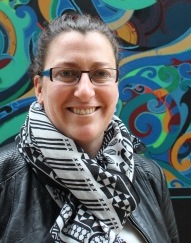 In June, Megan Pōtiki presented on her doctoral research on language loss at Ōtākou, at He Rau Tumu Kōrero IX at Te Rau Aroha Marae in Bluff. This event was run by Te Pouhere Kōrero, the national Māori historians organisation. Megan has also published two journal articles, “The Otago Peninsula: A unique identity” in Shima, 10, 1 (2016): 67-84 [Potiki-Shima-v10n1-3]; and ‘Te Haka Nā Ngā Herehere’ in Te Pouhere Kōrero 8 (2016): 6 –25, and is currently working on another article, “Māori song composition and reclamation of traditional tribal borders” based on a mōteatea she composed for the Te Tumu Kapa Haka group.
In June, Megan Pōtiki presented on her doctoral research on language loss at Ōtākou, at He Rau Tumu Kōrero IX at Te Rau Aroha Marae in Bluff. This event was run by Te Pouhere Kōrero, the national Māori historians organisation. Megan has also published two journal articles, “The Otago Peninsula: A unique identity” in Shima, 10, 1 (2016): 67-84 [Potiki-Shima-v10n1-3]; and ‘Te Haka Nā Ngā Herehere’ in Te Pouhere Kōrero 8 (2016): 6 –25, and is currently working on another article, “Māori song composition and reclamation of traditional tribal borders” based on a mōteatea she composed for the Te Tumu Kapa Haka group.
As part of Māori language week this year Tangiwai Rewi was asked to give a Library research floor talk on Wednesday 13 July on the Ngāruawāhia Turangawaewae regatta, which comes out of her doctoral research and an article last year in the Journal of the Polynesian Society. A display themed around the article was shown in the Hocken Collections for seven weeks as part of Māori language Week. Click here for more details and pictures.
Tangiwai has participated in the Ahi Pepe Resource launch 27 October and Wānanga 26-28 October. She was a collaborator in this project which created an immersion te reo Māori Moths resource depicting the 600+ species endemic to the South Island. Twelve schools were invited to the Wānanga, to participate, learn how to trap, kill and present moths for identification and preservation. Also launched that night were the bilingual and total immersion resource covering the four areas of the South Island.
Tangiwai also attended the SCANZ (Science Communicators Association NZ) conference on 14 November as part of the panel who discussed the resource and preservation of moths.
Tangiwai went north to attend the Te Awamārahi poukai on 24 November. (Poukai are ceremonial gatherings held on Kīngitanga marae.) This was an opportunity to take the photo display back to her marae especially as some of people featured in the photos come from that marae. The photo boards were put on display along with other harakeke resources found along the riverbanks. Needless to say, Tangiwai also vigorously promoted Te Tumu and the University of Otago to all the people who came to view the display.
Postgraduate News
Congratulations to Matangi Schaaf who graduates in December with a PhD; and also to Nikki Walden (Taranaki, Te Āti Awa) and Nurul Sultan with Master of Indigenous Studies degrees. Click here for more details.
Two of our PhD students are submitting in December: John Birnie and Taomi Qiliho-Tapu, and Tāwini White (Ngāi Tahu, Te Rarawa) is making the final amendments to her MA thesis. Rieko Hayakawa‘s PhD thesis ‘Possibility of Telecommunication Universal Service in the Pacific Islands; Case studies of Vanuatu, PEACESAT and USPNet’ has just passed examination. We look forward to these students graduating in the near future.
We have a new PhD student who has just started, Raaniera Te Whata (Ngāpuhi, Ngāti Porou, te Whānau a Apanui), researching communities-based Māori land development in the Bay of Islands. Raaniera comes into doctoral studies after completing an LLB in Auckland and a Master of Indigenous Studies in Te Tumu.
In August Erica Newman who is undertaking PhD research on Fijian Orphanages (1874-1970) presented at the Anthropology and Archaeology Postgraduate Symposium held here in Dunedin.
Matiu Payne (Ngāi Tahu, Ngāti Mutunga), who is researching the impact of government agencies on tikanga whāngai for his doctoral studies, has just been to the Australia New Zealand Law and History Society conference at Curtin University in Perth presenting on his PhD research.
Kelli Te Maihāroa (Waitaha) who is researching Māori peace traditions and their relevance to whānau today, has co-edited an edited collection: H. Devere, K. Te Maihāroa, & J.P. Synott (eds.) Peacebuilding and the Rights of Indigenous Peoples: Experiences and Strategies for the 21st Century, (Springer: Cham, Switzerland, 2016), which includes two co-written and one sole-authored articles by Kelli. She also has an article forthcoming, “Whanaungatanga: Relationships in a One Day Te Reo Māori School of Excellence” in Theobald, M. (Ed.) Friendships in Multilingual Settings (Sociological Studies of Children and Youth, Vol 21 (2016)). Emerald. Kelli, who is a lecturer in the College of Education, also presented at the Teacher Education Forum of Aotearoa New Zealand, in June/July in Dunedin, and at International Indigenous Research Conference in November in Auckland.
Waitangi Day Lecture
Te Tumu staff member, Lachy Paterson, will be giving a talk at the Dunedin Public Library on Waitangi Day. Click here for details.

